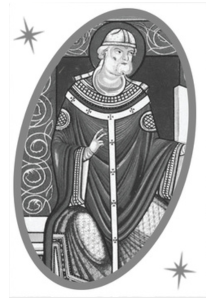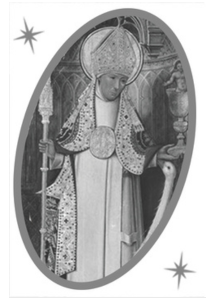And...we're back for the first full week of saintly action as Gregory the Great squares off against Hugh of Lincoln!
In the only Saturday matchup of the season, Elizabeth of Hungary snatched a spot in the Saintly Sixteen by soundly defeating Felicity 70% to 30%.
Stay tuned later today as Tim and Scott share some Breaking News on a fun-filled, informative, and never-a-dull-moment edition of Monday Madness.
Vote now!
Gregory the Great
 It is a truth universally acknowledged, that a single man in possession of a good fortune, who thereupon retires to a monastery, must not be in want of a papacy. Yet if history teaches us but one thing, it is that the church often tends to come calling for leadership from those who sought to eschew the trappings of power and privilege. Such it was with Gregory I, one of only two popes to carry the title of “the Great.” The son of a Roman senator and a prefect of Rome, he sold his vast estates for the benefit of the poor and the foundation of monasteries—one of which he himself entered in 573. Later in life, Gregory would be filled with nostalgia for his austere life, and rightly so, seeing as his time in the monastery would last only six years.
It is a truth universally acknowledged, that a single man in possession of a good fortune, who thereupon retires to a monastery, must not be in want of a papacy. Yet if history teaches us but one thing, it is that the church often tends to come calling for leadership from those who sought to eschew the trappings of power and privilege. Such it was with Gregory I, one of only two popes to carry the title of “the Great.” The son of a Roman senator and a prefect of Rome, he sold his vast estates for the benefit of the poor and the foundation of monasteries—one of which he himself entered in 573. Later in life, Gregory would be filled with nostalgia for his austere life, and rightly so, seeing as his time in the monastery would last only six years.
Gregory was called by the pope to serve as Ambassador to Constantinople in 579; after six years of service in Byzantium, he returned to Rome, and again attempted to return to monastic life as the abbot of a monastery, convinced that the future of Christianity lay with monasticism rather than with the declining powers of empire. Although he had aspirations of leading missionaries to work among the Anglo-Saxons in Britain, he was elected as Bishop of Rome and became Pope Gregory I in 590. (Gregory would later send the monk Augustine to the Anglo Saxons in 596, earning him the title of “Apostle of the English.”)
Gregory inherited charge over the church in a stressful time. He had to organize the defense of Rome against invaders and arrange for its feeding from the riches of papal granaries away from the city. In 592, separately from the permission of the emperor, he made peace with the invaders and appointed Church governors to manage Italian towns and estates during the breakdown in imperial authority amid the crumbling Eastern empire.
Gregory’s impact on the church was profound. He set in motion the systematization and ordering of the Western liturgy—including in the codification and adaptation of preexisting forms of plainsong into what we now know as “Gregorian Chant.” He wrote the earliest account of the life of Benedict of Nursia, spurring the greater adoption of his rule among monastic communities. His Book of Pastoral Rule became a classic text on the work of ministry and is still commonly loved.
For all of Gregory’s centrality to the restoration of the Western church among the ruins of empire, it is his humility that is long remembered. A title he assumed for himself alone was later adopted for future Bishops of Rome—servus servorum Dei— servant to the servants of God.”
Collect for Gregory the Great
Almighty and merciful God, you raised up Gregory of Rome to be a servant of the servants of God, and inspired him to send missionaries to preach the Gospel to the English people: Preserve in your church the catholic and apostolic faith they taught, that your people, being fruitful in every good work, may receive the crown of glory that never fades away; through Jesus Christ our Lord, who lives and reigns with you and the Holy Spirit, one God, for ever and ever. Amen.
Hugh of Lincoln
 Hugh of Lincoln is the patron saint of many important things like cobblers and sick children, but, critically, he is also the patron saint of swans. Hugh is said to have had such companionship with the animals of the bishops’ palace in Lincon that wild swans would eat out of his hand and one white swan would follow him all around the grounds.
Hugh of Lincoln is the patron saint of many important things like cobblers and sick children, but, critically, he is also the patron saint of swans. Hugh is said to have had such companionship with the animals of the bishops’ palace in Lincon that wild swans would eat out of his hand and one white swan would follow him all around the grounds.
Long before the bishops’ palace in the mid-twelfth century, young Hugh was known to hold towels for his mother, Anne de Theys, as she washed the sores of lepers, which was undoubtedly a formative experience of faith in action. After his mother’s death, he was sent to a religious community, where he began to follow the Rule of St. Augustine. While not exactly a monastic community, this community dedicated their life to prayer, to service, and to the people of the churches around them. Hugh thrived and became a deacon while there, but ultimately desired a more secluded life of prayer and became a Carthusian monk in 1163, shortly after which he was ordained as a priest.
Hugh’s compassion, warmth, and humor flowed out of his conviction and work in the monastery to his fellow brothers, and even King Henry II soon learned of Hugh’s reputation. Henry II was desperately seeking repentance after Thomas Beckett’s death and was insistent that such a notable and faithful leader as Hugh come to be the prior of the Witham Charterhouse, the first Carthusian monastery in England: a truly great honor.
But Hugh’s motivation since his childhood of holding towels for his mother as she wiped the sores of lepers was never about seeking honor, and so he turned it down. It took two bishops whom he respected to talk him into it and he went to England in 1179. The focus of his work when he arrived was the condition of the hazardous living quarters for the monks and the lack of provision for the peasants who had been displaced to build this monastery. Rather than chastise the king when he happened upon him hunting on the grounds next to the monastery, he invited the king into a life of prayer for the people and for his own soul. Hugh was elected as Bishop of Lincoln in 1186, and after his death in 1200, he was canonized in 1220 and is celebrated on November 17th.
Hugh of Lincoln: patron saint of cobblers, sick children and people, and swans; friend to animals, peasants, and his fellow monks. He was faithful, prayerful, dedicated, and unyielding to his calling and work.
Collect for Hugh of Lincoln
Holy God, who endowed your servant Hugh of Lincoln with wise and cheerful boldness, and taught him to commend the discipline of holy life to kings and princes: Grant that we also, rejoicing in the Good News of your mercy, and fearing nothing but the loss of you, may be bold to speak the truth in love, in the name of Jesus Christ our Redeemer; who lives and reigns with you and the Holy Spirit, one God, for ever and ever. Amen.
96 comments on “Gregory the Great vs. Hugh of Lincoln”
Gregory the Great--his writings played no small part in my diss...
This system would not take my vote!
I voted for Hugh of Lincoln for the reason that he tried to make sure kings realized they answered to a higher power. I guess this is important for all leaders to acknowledge less they become tyrants. Also, great comment by John Cabot!!
Received 3/10 email so 10:30 PM?
I had already been on line and voted!!
Somethings wrong!
Sadly I received this too late to vote, but as a Lincolnshire gal, and as I would have voted for him anyway!, Hugh had my vote.
Why am I no longer getting these posts in my email, and why when I log in am I back a few days? LOts of glitches this year.